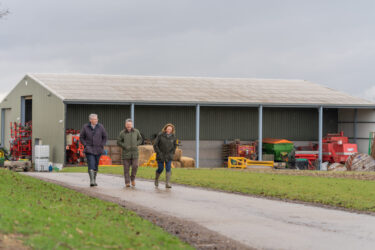To incorporate or not?

Most farming businesses tend to operate as sole traders or partnerships, however, several are now asking if it would be more beneficial to operate as a company. This article looks at some of the important points to consider before incorporating your farming business. One of the initial considerations is what should be incorporated. The whole […]
Share:
Most farming businesses tend to operate as sole traders or partnerships, however, several are now asking if it would be more beneficial to operate as a company. This article looks at some of the important points to consider before incorporating your farming business.
One of the initial considerations is what should be incorporated. The whole business can be transferred into a company, or just part of it could be incorporated. This could be just the machinery and labour to form a contracting arm of the business (that could also be the contractor to the in-hand farming operations, or other diversification venture where it can operate as an independent business).
The differences
It is important to understand the key differences between operating your business as a limited company, compared to an unincorporated sole trade or partnership.
A limited company is a separate legal entity owned by shareholders and controlled by directors. Any withdrawals from the company (usually by way of a salary or dividends) need to be formalised. This is in stark contrast to an unincorporated business where drawings can be taken as and when needed, without any formalisation or particular tax considerations.
Unincorporated business owners are taxed on the full amount of profit each year, regardless of how much is actually taken as drawings. For incorporated businesses, the company will pay corporation tax on the profits, and the individuals will pay income tax on their salary and dividends paid from the company. It is important to note that any salaries paid are deductible when calculating the profit of the company.
Pros & Cons
Tax savings are available where individuals are regularly exposed to profits that are taxed at the higher rates of income tax (40/45%). These savings are highlighted when the individuals do not need to withdraw all the income. The company would pay corporation tax at a lower rate on profits, and then income tax would only be paid on the amounts drawn from the company. As such, the undrawn portion of income would only suffer tax at the corporation tax rates. Structuring your income between salaries and dividends can also create savings in National Insurance.
Whilst it is still possible for there to be tax savings available when operating as a limited company, these have narrowed over recent years. From 1 April 2023, the corporation tax rate increased from 19% to 25% where taxable profits are greater than £250,000. Companies with profits under £50,000 continue to pay tax at 19%, with profits between £50,000 and £250,000 being taxed at the marginal rate of 26.5%; yes, the marginal rate is higher than the main rate!
There can be reliefs available to companies that are not available to unincorporated businesses. These include Research & Development claims and the ‘Full Expensing’ from 1 April 2023. Full expensing is a capital allowance which will allow for full deduction from taxable profits, for the cost of new and unused plant and machinery purchased each year, this is in addition to the more familiar Annual Investment Allowance.
A limited company does come with more administrative requirements than an unincorporated business. Annual accounts must comply with the relevant financial standards and the accounts are published on Companies House (the level of publishing depends on the size of the business). There are ongoing declarations to be made, for example potential Annual Tax on Enveloped Dwellings (ATED) returns to be filed if the company owns residential property valued in excess of £500,000, this would include farmhouses. There would also need to be a Pay As You Earn Scheme (PAYE) set up to pay salaries.
Wider consideration
IHT
Incorporating your business will not just affect how the income is taxed, it can also impact the inheritance tax position. Currently a farming business trading through a limited company that holds the land outside of the company, loses some of the reliefs that would potentially be available if they were trading as an unincorporated business.
Whilst Agricultural Property Relief (APR) should still be available at 100%, this only covers the agricultural value of the land. For any value above the agricultural value (e.g. development hope value) to qualify for relief from inheritance tax, the business would also need to qualify for Business Property Relief (BPR).
Land held outside of the company and owned by the farmer individually, would only qualify for BPR at a maximum rate of 50%. Furthermore, BPR would not be available if the land is owned by a minority shareholder, this being someone that owns less than 50% of the company. This means that if the land is jointly owned by more than 2 individuals, no BPR would be available.
BPR could be available at 100% for unincorporated businesses where the land is jointly owned within a partnership structure. This can be an important consideration in your decision of whether to incorporate.
CGT
Transferring land and property into a company would be a deemed disposal for the individuals and fall under the scope of Capital Gains Tax. The gain is calculated by using the market value of the assets as the proceeds, and deducting the initial purchase and any other relevant costs in the usual way.
Incorporation relief can be utilised if the business and all its assets, except cash, are transferred in return for shares in the company. This means that incorporation relief can’t be used in part incorporation.
It is also important to note that incorporation relief does not remove the gain, but defers the gain until such point that the shares in the company are sold.
Stamp Duty
Without going into detail here, it is worth noting that Stamp Duty may also be payable where land and property are transferred into a company.
Ultimately, the answer of whether you should incorporate, depends on your individual circumstances. It is important to consider the wider implications of incorporation and we at Ensors are here to help.
More newsletters for you




